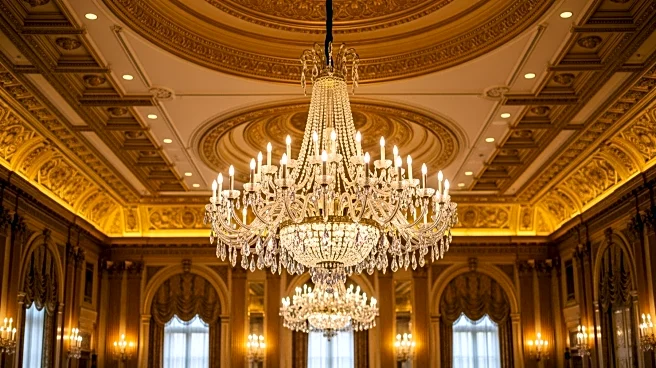What's Happening?
President Trump has announced that the funding for a new $300 million White House ballroom will be covered entirely by himself and a group of 37 donors. The list of contributors includes prominent figures from various industries such as technology, cryptocurrency,
energy, and philanthropy. Notable donors include tech giants like Amazon, Apple, and Google, as well as individuals like Howard Hamm and Stephen A. Schwarzman. The White House has not disclosed the specific amounts donated by each contributor, and some companies have opted to remain anonymous until required by financial disclosure regulations. The ballroom project is part of Trump's broader efforts to enhance the White House's infrastructure.
Why It's Important?
The construction of a new ballroom at the White House represents a significant investment in the nation's capital and highlights the influence of private donors in public projects. This development underscores the intersection of politics and business, as many donors have substantial interests in government policies. The involvement of tech and energy companies may reflect their strategic interests in maintaining favorable relations with the administration. The ballroom could serve as a venue for diplomatic events, potentially enhancing the U.S.'s ability to host international gatherings. However, the lack of transparency regarding donation amounts raises questions about the influence of private money in public affairs.
What's Next?
As the project progresses, further details about the ballroom's design and construction timeline are expected to be released. The White House may face scrutiny over the transparency of donor contributions and the potential implications for policy decisions. Stakeholders, including political leaders and civil society groups, may call for more stringent regulations on political donations to ensure accountability. The ballroom's completion could lead to increased diplomatic activity at the White House, potentially impacting U.S. foreign relations.
Beyond the Headlines
The involvement of diverse industries in funding the ballroom highlights the complex relationship between business interests and political influence. Ethical considerations regarding the transparency of donations and their impact on policy decisions may arise. The project could set a precedent for future private funding of public infrastructure, prompting discussions on the role of private capital in government projects.















